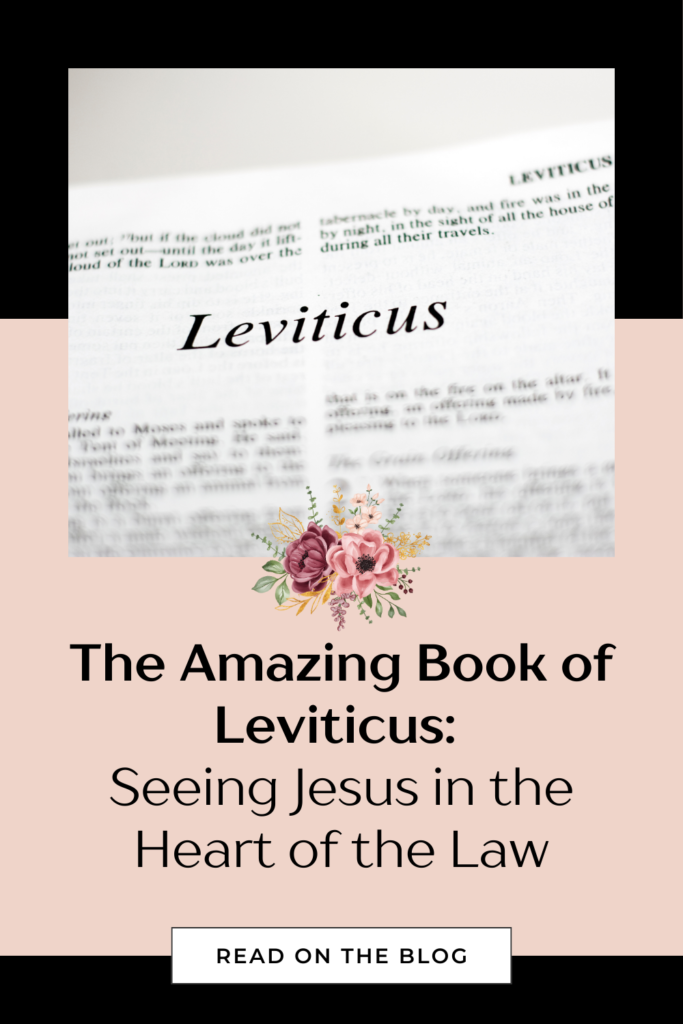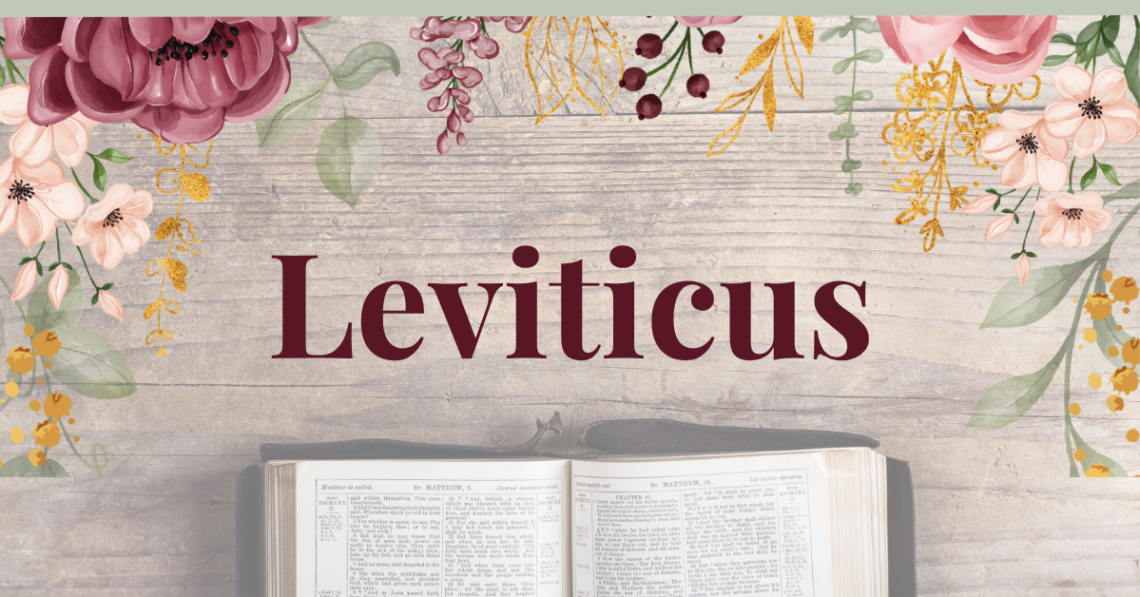The Book of Leviticus can often be overlooked by modern readers due to its detailed laws and rituals. However, it is a crucial part of the Bible that provides deep insight into God’s holiness, the need for atonement, and His desire for a relationship with His people. Leviticus also foreshadows the ultimate sacrifice of Jesus Christ, showing how His work fulfills the purpose of these laws. So, we’ll explore the key themes and structure of Leviticus, its significance, and how we can see Jesus throughout its pages.
Background of Leviticus
Leviticus is the third book of the Bible. It contains detailed instructions on how the Israelites were to worship God, maintain purity, and live according to His holiness. The title “Leviticus” comes from the tribe of Levi, the priestly tribe, as much of the content centers on the roles and duties of priests and Levites. It is believed to have been written by Moses. It serves as a guide for the Israelites to live out the covenant God made with them.
Leviticus is divided into several sections, focusing on offerings, purification laws, the Day of Atonement, and holiness in daily life. These laws were given to ensure that Israel remained a holy nation, set apart for God’s purposes. Though these laws were specific to Israel, they point forward to Jesus, the ultimate fulfillment of the Law.
The Offerings and Sacrifices (Leviticus 1–7)
The first section of Leviticus outlines various offerings and sacrifices that the Israelites were to bring to the Lord. These sacrifices were meant to atone for sins, express thanksgiving, and maintain a right relationship with God. In them, we see a picture of Jesus’ ultimate sacrifice.
The Burnt Offering (Leviticus 1)
The burnt offering was a sacrifice of an unblemished animal, completely consumed by fire. This offering symbolized complete surrender to God. Jesus, the perfect Lamb of God, offered Himself fully as the ultimate sacrifice for our sins (Romans 12:1, Hebrews 10:10).
The Grain Offering (Leviticus 2)
The grain offering was an offering of fine flour, oil, and frankincense. It symbolized the worshiper’s devotion and thankfulness. Jesus is often referred to as the “Bread of Life” (John 6:35), representing God’s provision for His people.
The Peace Offering (Leviticus 3)
The peace offering was a sacrifice made to seek reconciliation with God. It points to the peace that Jesus brings between humanity and God through His sacrifice on the cross (Ephesians 2:14-16).
The Sin and Guilt Offerings (Leviticus 4–5)
These offerings were made for unintentional sins and violations of God’s law. Jesus became the ultimate sin offering, taking upon Himself the sins of the world. He offers forgiveness to all who believe in Him (2 Corinthians 5:21, Hebrews 9:28).

Purification and Holiness Laws (Leviticus 11–16)
Thus, Leviticus also contains a number of laws regarding purity, cleanliness, and holiness. These laws were meant to set Israel apart as a holy people for God. While some of these laws are no longer directly applicable, they point to the need for inner purity and holiness, fulfilled in Jesus.
The Laws of Clean and Unclean (Leviticus 11)
The Israelites were instructed on what animals were clean and unclean to eat. These dietary laws pointed to the holiness God desired for His people. So, Jesus came to fulfill the law, showing that true purity comes not from what we eat, but from a purified heart through Him (Mark 7:18-19, Acts 10:15).
The Day of Atonement (Leviticus 16)
The Day of Atonement was the most important day in the Jewish calendar. On this day, the high priest would offer sacrifices for the sins of the people. This included sending a scapegoat into the wilderness to carry the sins away. Therefore, this day pointed to Jesus as our ultimate atonement. His sacrifice, once and for all, cleanses us from sin and allows us to be reconciled with God (Hebrews 9:11-14).
Holiness in Everyday Life (Leviticus 17–20)
These chapters lay out laws about moral behavior, social justice, and religious conduct. God calls His people to live in a way that reflects His holiness. So, Jesus lived a perfect life and showed us how to live in holiness, loving God and others (Matthew 5:48, 1 Peter 1:15-16).
The Priesthood and the Role of Jesus (Leviticus 8–10, 21–22)
Leviticus also contains instructions on the roles and responsibilities of priests, who were responsible for offering sacrifices and maintaining the purity of the temple. Jesus is the great High Priest who fulfills and surpasses the Levitical priesthood.
The Ordination of the Priests (Leviticus 8–10)
God instructs Moses to ordain Aaron and his sons as priests. Their role was to mediate between God and Israel. Jesus, however, is the ultimate High Priest who intercedes on behalf of humanity. His sacrifice opened the way for all believers to approach God directly (Hebrews 4:14-16, 7:27).
The Qualifications for Priests (Leviticus 21–22)
The priests had to meet strict qualifications to serve in the Tabernacle. They were to be holy and without blemish, pointing to the perfection of Jesus, who, as our High Priest, is sinless and holy, making the perfect sacrifice for us (1 Peter 2:22).
Where You Can See Jesus in Leviticus
In the Sacrificial System: The various offerings and sacrifices point to Jesus, the Lamb of God, who offered Himself as the ultimate sacrifice for sin. His death fulfills the purpose of all the sacrificial laws in Leviticus, providing forgiveness for humanity.
In the Day of Atonement: The ritual of the Day of Atonement, with its sacrifice and scapegoat, foreshadows Jesus’ ultimate atoning sacrifice. Through His death, He takes away our sins and reconciles us to God once and for all.
In Holiness Laws: The call to holiness in Leviticus reflects Jesus’ life, which was perfect in holiness. He fulfills the Law and makes us holy by His sacrifice and through the work of the Holy Spirit in our lives.
In the Priesthood: The Levitical priests served as mediators between God and the people. Jesus, as the great High Priest, is the mediator of a new and better covenant, offering Himself as the perfect sacrifice for sin (Hebrews 9:11-14).
Key Themes in Leviticus
- Atonement for Sin: Leviticus shows the need for atonement and sacrifice for sin, a need that Jesus fulfills through His death on the cross.
- God’s Holiness: Leviticus emphasizes God’s holiness and His desire for His people to be holy as well. Through Jesus, we are made holy and able to approach God.
- The Role of the Priesthood: The priesthood points to Jesus as the ultimate High Priest who intercedes for us and offers the perfect sacrifice.
- Sacrifice and Obedience: Leviticus calls for sacrifices and obedience, pointing to the ultimate sacrifice of Jesus, which calls for our faith and obedience.
How We Can Apply Leviticus to Our Lives Today
Though the specific laws in Leviticus are no longer applicable under the New Covenant, the principles behind them are deeply relevant. Here are some ways we can apply the lessons from Leviticus to our lives today:
- Recognizing the Need for Atonement: Leviticus shows the serious consequences of sin and the need for atonement. Jesus provides that atonement for us, and we are called to accept His forgiveness and live in gratitude for His sacrifice.
- Living in Holiness: Leviticus calls God’s people to holiness. As Christians, we are also called to live holy lives, reflecting God’s character to the world around us (1 Peter 1:15-16).
- Honoring Jesus as Our High Priest: Just as the priests in Leviticus interceded for the people, Jesus intercedes for us. We can approach God confidently, knowing that He is our advocate and mediator.
- Obeying God’s Commands: Leviticus shows the importance of following God’s commands. While we are no longer bound by the Law, Jesus’ commandments to love God and love others are still essential to our walk with Him (Matthew 22:37-40).
Conclusion
The Book of Leviticus is often misunderstood, but it is rich with spiritual significance and points to the ultimate sacrifice of Jesus Christ. From the sacrificial system to the Day of Atonement, from the priesthood to the call to holiness, Leviticus foreshadows the work of Jesus in powerful ways. Jesus is the fulfillment of the Law, and through His sacrifice, we are made holy and reconciled to God. As you read Leviticus, look for these glimpses of Christ and be reminded of the incredible grace and mercy He offers to us today.
Call to Action
I’d love to hear how the Book of Leviticus has deepened your understanding of Jesus and His sacrifice! What lessons from Leviticus do you find most meaningful in your walk with God? Share your thoughts in the comments below, and feel free to ask any questions about how the Old Testament points to Christ. If this post resonated with you, don’t hesitate to share it with others who are exploring the depths of Scripture!






